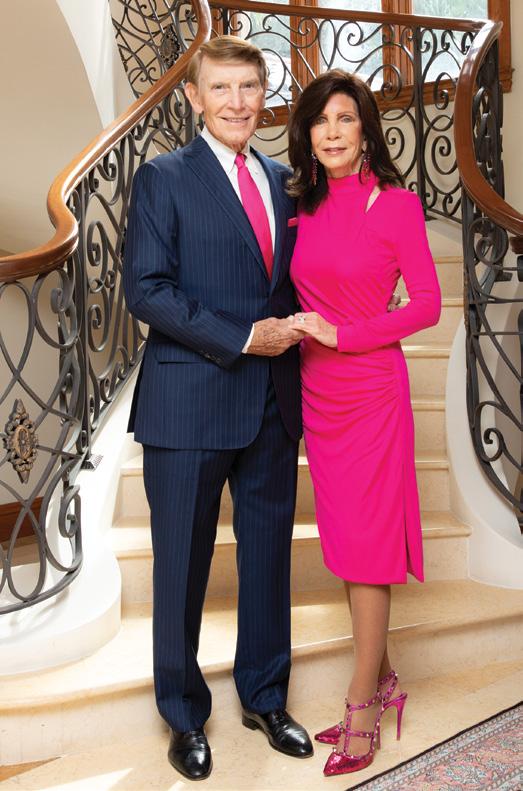
6 minute read
THE GIVERS
The Art Of Philanthropy In Coral Gables
BY J.P. FABER
PHOTOS BY JONATHAN DANN
The word itself tells the tale: Derived from the Latin roots for “loving” (philo) and mankind (anthropo), it means “love of mankind,” especially in the form of deeds of generosity and work for the good of others.
Here in Coral Gables, philanthropy is rampant. Partly it’s because we are an affluent community. Many affluent Gables residents either understand how tough life can be – having created their fortunes from scratch – or come from a family tradition of beneficence. What is as remarkable as their monetary generosity is the extent to which Gables philanthropists also give their time and energy. While the givers we recognize here are affluent, they give much more than money. Many are hands-on involved with the charities they love, helping to guide them and to raise additional funds.
Having lots of money, however, is not the point, says Thomas Abraham of the Abraham Foundation. “Each of us has the power to make a difference in other people’s lives,” he says. “If we all did our own little bit it would change the world. That is the message our foundation promotes. You don’t need to be rich… a respect for humanity can change the world, and it doesn’t take money for that.”
Indeed, while money can help a great deal, there is plenty of work to be done just by rolling up your proverbial sleeves and helping. “With these charitable organizations there is always the need for participants who can volunteer, take on chores and lead,” notes ambassador and philanthropist Chuck Cobb.
And while giving money to philanthropic causes may seem the province of families with generations of wealth, many of Coral Gables’ most active givers came from modest backgrounds and see philanthropy as a way to help others who come from a similarly underprivileged place. “I grew up poor and believe that giving back is the grateful thing you can do… it’s about helping people in tough situations,” says attorney Aaron Podhurst. For such people, for whom a scholarship-based education proved critical in life, much of the charitable work focuses on helping raise money for schools, and for poor, but hardworking students.
In some cases, the philanthropy is based on deep religious convictions. This is the case with Trish and Dan Bell, whose latest charitable effort is the construction of an interfaith chapel at FIU. “Giving of course makes us feel good, but that is definitely not the primary reason we give,” says Trish. “We give because, for us, it is the proper response to having received so many blessings… This is actually not very different than what all of us learned in kindergarten – namely, that we all have an obligation to share.”
As former Florida Secretary of State Sue Cobb notes, “In the local community there are all kinds of different ways to help people. In the end, it is part of fulfilling our roles in life to help.”
And then there is simply the joy of giving, and how that makes you feel. Is it better to give than receive? “The feeling you get when you help someone out is indescribable,” says entrepreneur Matthew Meehan. “There is nothing you can buy, or anyplace you can travel to, that feels better than helping out a neighbor. That is a feeling I want to have over and over again.” ■
THE GIVERS:
THOMAS & NORMA JEAN ABRAHAM
FOCUS: GLOBAL
For siblings Thomas and Norma Jean Abraham, the idea of charity was inculcated at an early age. “[My father] was a rags to riches story,” says Norma Jean. “When he made a lot of money [through car dealerships, an ad firm and real estate] he said he wanted to give back.” Initially, the Abraham Foundation he started was run by their mother, who was a patron of both local opera and ballet. But when she passed away, the reigns were turned over to the children.
“I don’t like opera or ballet,” admits Norma Jean. “But we have stuck with [the charities] that had to do with children and education.” More than just sticking with them, the Abrahams have been active with more than 90 charities, from the Buoniconti Fund to cure paralysis to Nicklaus Children’s Hospital to Camillus House. They also contribute to UM, Barry University, FIU, Ransom Everglades School and the Lebanese American University (the Abraham family is Lebanese).
A special place for them is St. Jude’s Children’s Hospital, which their father started with fellow Lebanese descendant Danny Thomas. When their mother was alive, the Abrahams hosted an annual Miracle Ball for St. Jude’s, which often included celebrities. When their mothed died, Frank Sinatra came to last the ball, to honor her work.
The Abraham siblings have also worked to help in crisis locations worldwide, where there are local natural disasters, by donating to local churches to help with relief efforts. “Both of our parents were humble people who had a real concern for those who were distressed,” says Thomas. “It’s part of our Lebanese heritage, not because we like to be patted on the back, but because it’s the right thing to do.”
THE GIVERS: TRISH AND DAN BELL
FOCUS: UNDERSERVED FAMILIES, EDUCATION, FAITH-BASED ENDEAVORS
Over the past 30 years, the Bells have donated more than $30 million to more than 40 organizations, mostly within the Miami community. These have included faith-based entities, community support groups, educational institutions, medical organizations and arts organizations.
While Dan achieved great success as the founding CEO of Kos Pharmaceuticals (sold in 2006 for $3.7 billion), both he and Trish came from modest backgrounds. “Neither set of our parents ever had any ‘extra’ financial resources to share with others,” says Trish. But both sets “were very loving and generous individuals who would do anything they could to help others.” From the beginning of their marriage, the Bells made a practice of setting aside 10 percent of all they earned for charity, following the tithing practice of many churchgoers.

Over the years, that 10 percent set aside has steadily risen. “In essence, we believe that those who have been more generously blessed should also share more generously,” says Trish.
While the Bells don’t like to focus on any one charity at the expense of others, their most recent philanthropic project –creating an interfaith chapel on the campus at FIU, toward which they have donated $5 million – “is likely to bring us the most sustained joy for any we have yet undertaken.”
Another major effort they have dedicated considerable resources and time to for over 15 years is Branches, a nonprofit providing tutoring and mentoring to underserved children and their families. Since 2005, the organization has grown from serving 40 elementary school children at one small site, to now serving more than 400 K-12 students at three sites – and over 40 college students, most of whom are the first in their families to attend college.

THE GIVER: BILL BONN
FOCUS: THE CORAL GABLES COMMUNITY FOUNDATION

For Bill Bonn, the idea of giving back to the community was instilled at an early age. On one side of the family, his grandfather came from Germany via Ellis Island. That grandfather married the daughter of an English civil servant born in Barbados. “It’s really quite straight forward. My grandparents [on this side] were imbued with a sense of responsibility for the people around them, their siblings, their loved ones and their friends,” he says.
“The other grandparents came from the Outer Hebrides, where there is a real sense of helping each other,” he says. “The Scottish are a fiercely proud people and fiercely independent, but with a cultural background of civic duty and responsibility for your neighbors. My three siblings are the same, and we all try to give back in one shape or form.”
When Bonn retired from working as a high-powered corporate attorney and got more involved in charity, he says “It was a wonderful transition from a 70-hour work week to something I felt useful doing.” After moving here, he says the charity that caught his eye was the Coral Gables Community Foundation.
“The great thing about a community foundation is that you are giving back locally,” says Bonn. “When you give back at the local level, the impact of your time or money is readily apparent. I still give to national charities, but you don’t really see the impact there. At the local level it is much more emotionally rewarding.”
Bonn also loves the foundation’s flexibility. “When pockets of need appear, the CGCF can step in – like when the pandemic hit and a lot of people were out of work, they came up with the idea of distributing food from the leftovers [of farms and restaurants]... it’s clearly [partner] Ruben’s and my favorite charity.”










